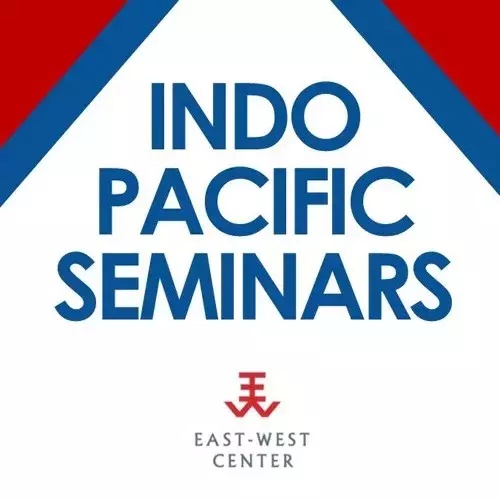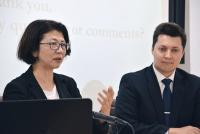Error message

OFFICE/DEPARTMENT
Who Shapes Infrastructure Development Policy for East Asia? Policy Diffusion and Japan-China Dynamics
An Indo-Pacific Political Economy and Trade Seminar featuring:
Dr. Saori N. Katada
Professor at School of International Relations &
Director, Center for International Studies (CIS) University of Southern California
Mr. Ross J. Tokola (Moderator)
Executive Associate to the Director, East-West Center in Washington
Facing infrastructure export competition from China through its Belt-and-Road Initiative, the Japanese government has bolstered its own version of “quality infrastructure exports,” especially to developing countries in the Indo-Pacific. Despite the

apparent distinction of quality versus low-cost, the way that these two countries promote infrastructure investments in East Asia share many characteristics, from the government-led strategy to key emphasis on certain physical constructions. By analyzing the recent infrastructure “competition” between Japan and China, this project examined how infrastructure development policy is shaped in East Asia.
For more images, please visit the album for this event on the East-West Center's Flickr page.
SPEAKER BIOGRAPHIES
Saori N. Katada is Professor at School of International Relations and the Director of the Center for International Studies (CIS) at University of Southern California. She is a co-author of two books: The BRICS and Collective Financial Statecraft (Oxford University Press, 2017), and Taming Japan’s Deflation: The Debate over Unconventional Monetary Policy (Cornell University Press, 2018). Her single-authored book, Banking on Stability: Japan and the Cross-Pacific Dynamics of International Financial Crisis Management (University of Michigan Press, 2001), received Masayoshi Ohira Memorial Book Award. She has also published six edited and co-edited books and numerous articles on the subjects of trade, financial, and monetary cooperation in East Asia as well as Japanese foreign aid. Her current project is on Japan’s foreign economic policy and East Asian regionalism. For her research on regionalism, she was recently awarded the Asia Studies Fellow at the East-West Center in Washington, a Japan Foundation Research Grant and the National Endowment for the Humanities Fellowship. She has her Ph.D. from the University of North Carolina at Chapel Hill (Political Science) in 1994, and B.A. from Hitotsubashi University (Tokyo). Before joining USC, she served as a researcher at the World Bank in Washington D.C., and as International Program officer at the UNDP in Mexico City.
Mr. Ross Tokola is the Executive Associate to the Director at the East-West Center in Washington. Previously, he was a Program Officer at the Asan Institute for Policy Studies during his five years in Seoul, and worked for the US embassies both in the Republic of Korea and in the United Kingdom. In Washington, D.C., he worked for the US House of Representatives Committee on Ways and Means, carried out research projects on behalf of US-based Korea policy experts, and was Assistant Editor for The Asan Forum: An Online Journal. Born in Brussels, Mr. Tokola’s overseas experience includes living in Belgium, Scotland, Iceland, the Netherlands, Mongolia, England, and South Korea. For work, he has traveled to China and Japan. Independently, he has traveled across Europe, Israel and the West Bank, Northern India as well as the Russian Far East. In addition to studying the Korean language at Sogang University in Seoul, he holds a first class honors B.A. and M.A. in Philosophy from Heythrop College, University of London, and a M.Phil. in International Relations from the Department of Politics and International Studies at the University of Cambridge.
Who Shapes Infrastructure Development Policy for East Asia? Policy Diffusion and Japan-China Dynamics
An Indo-Pacific Political Economy and Trade Seminar featuring:
Dr. Saori N. Katada
Professor at School of International Relations &
Director, Center for International Studies (CIS) University of Southern California
Mr. Ross J. Tokola (Moderator)
Executive Associate to the Director, East-West Center in Washington
Facing infrastructure export competition from China through its Belt-and-Road Initiative, the Japanese government has bolstered its own version of “quality infrastructure exports,” especially to developing countries in the Indo-Pacific. Despite the

apparent distinction of quality versus low-cost, the way that these two countries promote infrastructure investments in East Asia share many characteristics, from the government-led strategy to key emphasis on certain physical constructions. By analyzing the recent infrastructure “competition” between Japan and China, this project examined how infrastructure development policy is shaped in East Asia.
For more images, please visit the album for this event on the East-West Center's Flickr page.
SPEAKER BIOGRAPHIES
Saori N. Katada is Professor at School of International Relations and the Director of the Center for International Studies (CIS) at University of Southern California. She is a co-author of two books: The BRICS and Collective Financial Statecraft (Oxford University Press, 2017), and Taming Japan’s Deflation: The Debate over Unconventional Monetary Policy (Cornell University Press, 2018). Her single-authored book, Banking on Stability: Japan and the Cross-Pacific Dynamics of International Financial Crisis Management (University of Michigan Press, 2001), received Masayoshi Ohira Memorial Book Award. She has also published six edited and co-edited books and numerous articles on the subjects of trade, financial, and monetary cooperation in East Asia as well as Japanese foreign aid. Her current project is on Japan’s foreign economic policy and East Asian regionalism. For her research on regionalism, she was recently awarded the Asia Studies Fellow at the East-West Center in Washington, a Japan Foundation Research Grant and the National Endowment for the Humanities Fellowship. She has her Ph.D. from the University of North Carolina at Chapel Hill (Political Science) in 1994, and B.A. from Hitotsubashi University (Tokyo). Before joining USC, she served as a researcher at the World Bank in Washington D.C., and as International Program officer at the UNDP in Mexico City.
Mr. Ross Tokola is the Executive Associate to the Director at the East-West Center in Washington. Previously, he was a Program Officer at the Asan Institute for Policy Studies during his five years in Seoul, and worked for the US embassies both in the Republic of Korea and in the United Kingdom. In Washington, D.C., he worked for the US House of Representatives Committee on Ways and Means, carried out research projects on behalf of US-based Korea policy experts, and was Assistant Editor for The Asan Forum: An Online Journal. Born in Brussels, Mr. Tokola’s overseas experience includes living in Belgium, Scotland, Iceland, the Netherlands, Mongolia, England, and South Korea. For work, he has traveled to China and Japan. Independently, he has traveled across Europe, Israel and the West Bank, Northern India as well as the Russian Far East. In addition to studying the Korean language at Sogang University in Seoul, he holds a first class honors B.A. and M.A. in Philosophy from Heythrop College, University of London, and a M.Phil. in International Relations from the Department of Politics and International Studies at the University of Cambridge.









